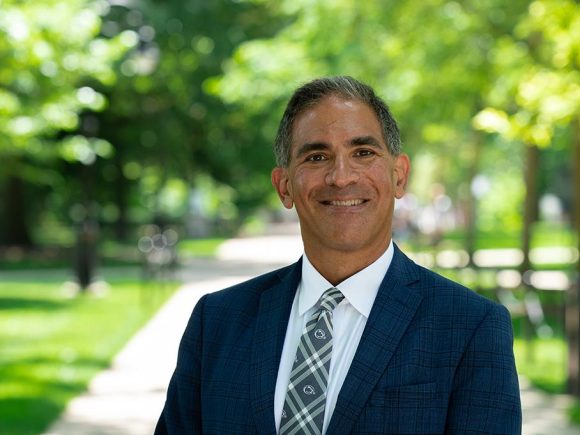
Dr. Justin Schwartz is CU Boulder’s new chancellor. (Courtesy of Pennsylvania State University)
On July 2, the second day of his term as the new chancellor of the University of Colorado Boulder, Justin Schwartz sat down with the CU Independent to discuss his mindset as he begins his tenure leading CU Boulder’s student body.
Schwartz, who has worked at Florida State University, North Carolina State University and Pennsylvania State University, emphasized his commitment to large, public universities like CU Boulder.
“I’ve been in large state universities — literally since I graduated high school — continuously,” Schwartz said. “And that’s not by coincidence. It’s the mission of the large state university that has always just been more meaningful to me.”
Schwartz said the missions and focuses of CU Boulder, in particular, are what drew him to his current position as the 12th chancellor of the university.
“[CU Boulder’s] focus on sustainability, holistic approaches to inclusivity, wanting to really not just focus on excellence, but also focus on impact, focus on leadership, entrepreneurship, innovation. All these things that were just sort of core to what I enjoy,” he said.
Schwartz cited further developments in sustainability as one of his top priorities as he enters his new position.
“I want us to be one of those universities that, in the future, when people look back saying, ‘yeah, we really did change the way we function as a society,’ some of that attributes back to what [we] did at [CU] Boulder,” Schwartz said.
While numerous STEM programs, such as environmental engineering and a masters of the environment graduate program, include sustainability as a part of the curriculum, Schwartz said he wants to expand this focus to other programs and departments.
“I really want us to think holistically about how we build educational opportunities for all of our students to be [for example] a communications major who really understands sustainability and how those things interrelate,” he said.
Schwartz also discussed his goal to improve graduation rates across all demographics of students.
“I’d like to see our four and six-year graduation rates be even higher,” Schwartz said. “They’re not low but there’s always room to go up significantly, and I’d like to see those increase and also increase across all demographic groups to close demographic gaps between their success.”
As of fall 2023, the most recent year from which data was available, the overall four-year graduation rate for the class that entered the university in 2019 was 57%. For BIPOC students in the same class, this rate was 53%.
Additionally, the overall six-year graduation rate, for students who entered the university in 2017 and graduated in 2023, was 75%. For BIPOC students, this rate was 73%.
Schwartz also touched on a number of the unique challenges facing today’s college students.
In regards to the persistent issue of sexual assault on college campuses, Schwartz said he wanted to look into the efficacy of CU Boulder’s sexual assault prevention training and ensure university response to assault avoided re-traumatizing victims.
“I’m a big proponent that we shouldn’t be focusing on how to teach women not to get raped,” Schwartz said. “We should be teaching men not to rape. The impetus should not be on the potential victim to prevent the crime.”
He praised the university’s mandatory discrimination, harassment and sexual misconduct training for onboarding students and acknowledged that addressing sexual assault issues is “critically important.”
“This [sexual assault prevention and response] is one of those areas of ‘we’re doing okay, let’s do good.’ If we’re doing good, let’s do better. If we’re doing better, let’s do great,” he said.
Schwartz added that as the university changes under his term as chancellor, he wants to ensure that he stays in touch with students’ needs and priorities. In his first days as chancellor, he met with CU Student Government leadership and discussed the importance of safe and open discussion among students in the face of the upcoming November election among other pressing issues.
“[In] higher ed, you’ll hear people say, ‘Oh, you got to meet students where they are,’ and that’s true,” Schwartz said. “We also need to think about not just meeting students where they are but helping them know where they want to go.”
Contact CU Independent Editor-in-Chief Jessi Sachs at jessica.sachs@colorado.edu.
Contact CU Independent Managing Editor Ann Marie Vanderveen at ann.vanderveen@colorado.edu.
